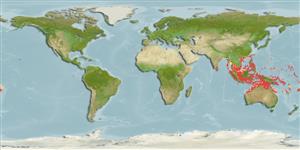分類 / Names
俗名 | 同種異名 | Catalog of Fishes(屬, 種) | ITIS | CoL | WoRMS | Cloffa
Environment: milieu / climate zone / depth range / distribution range
生態學
海洋; 半鹹淡水 礁區魚類; 深度上下限 5 - 80 m (Ref. 37816). 熱帶; 25°N - 21°S
Indo-West Pacific: Thailand to Vanuatu, north to the Ryukyu Islands (Ref. 559) and southeast China, south to Australia.
印度-西太平洋: 泰國到萬那度,北至琉球群島 (參考文獻 559) 與中國東南部。
大小 / 重量 / 年齡
Maturity: Lm ? range ? - ? cm
Max length : 25.0 cm TL 雄魚/尚未辨別雌雄; (Ref. 48635)
背棘 (總數): 15 - 17; 背的軟條 (總數): 7-9; 臀棘 2; 臀鰭軟條: 10 - 12. Body colors highly variable and best identified by the patterns on the fins (Ref. 48635). Lower 2 pectoral rays are entirely free and used as "walking" legs and the inner face of the fin is brightly colored (Ref. 37816).
體色高變異的而且在鰭上最易鑑定出來的特徵是圖案.(參考文獻 48635) 低的 2個胸鰭鰭條完全分離而且用作了 " 步行 " 腿,而且鰭的內面是色彩鮮豔的。 (參考文獻 37816)
Found on open sandy or silty substrates of lagoon and seaward reefs. Often buries itself and easily overlooked. Uses pectoral fins to startle predators and shows color during courtship (Ref. 48635). Feeds on small fishes and crustaceans (Ref. 9710). The venom of this fish can be deadly to man. Its ability to camouflage itself by living half-buried presents a real danger. Solitary on sand and mud bottoms (Ref 90102).
棲息於潟湖與臨海礁石的開放沙的或淤泥底部了。 時常埋藏它本身並且容易被看漏而不被發現。 使用胸鰭在求偶期期間驚嚇掠食者而且展現顏色.(參考文獻 48635) 吃小魚與甲殼動物。 (參考文獻 9710) 這一個魚的毒液能是致人於死。 藉由半埋藏的生活習性偽裝它本身的它能力呈現一種真正的危險。
Life cycle and mating behavior
成熟度 | 繁殖 | 產卵場 | 卵 | 孕卵數 | 仔魚
印度-西太平洋: 泰國到萬那度,北至琉球群島 (參考文獻 559) 與中國東南部。
Myers, R.F., 1991. Micronesian reef fishes. Second Ed. Coral Graphics, Barrigada, Guam. 298 p. (Ref. 1602)
人類使用
水族館: 商業性
更多資訊
俗名同種異名新陳代謝捕食者生態毒物學繁殖成熟度產卵場產卵群集孕卵數卵卵發育
參考文獻養殖養殖資訊品種遺傳學Electrophoreses遺傳率疾病加工NutrientsMass conversion
工具
特別的報告
下載 XML
網路資源
Estimates based on models
Preferred temperature (Ref.
123201): 26.3 - 29, mean 28.2 °C (based on 1088 cells).
Phylogenetic diversity index (Ref.
82804): PD
50 = 0.5010 [Uniqueness, from 0.5 = low to 2.0 = high].
Bayesian length-weight: a=0.01862 (0.01022 - 0.03394), b=2.89 (2.73 - 3.05), in cm total length, based on LWR estimates for this species & (Sub)family-body (Ref.
93245).
營養階層 (Ref.
69278): 4.0 ±0.66 se; based on food items.
回復力 (Ref.
120179): 中等的, 族群倍增時間最少 1.4 - 4.4年 (Preliminary K or Fecundity.).
Fishing Vulnerability (Ref.
59153): Low vulnerability (15 of 100).
Nutrients (Ref.
124155): Calcium = 55.4 [23.3, 140.2] mg/100g; Iron = 0.564 [0.265, 1.169] mg/100g; Protein = 18 [16, 20] %; Omega3 = 0.197 [0.081, 0.589] g/100g; Selenium = 31.7 [15.2, 76.9] μg/100g; VitaminA = 81.8 [20.5, 340.5] μg/100g; Zinc = 1.22 [0.79, 1.85] mg/100g (wet weight);
